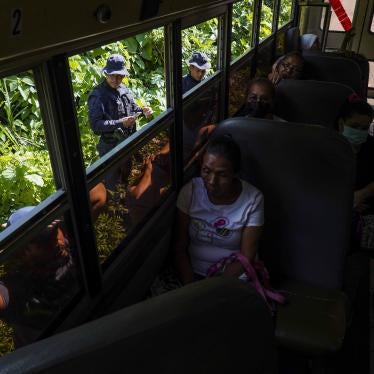(Santiago) — A law approved last night by the Chilean Congress that denies courts access to the testimonies of thousands of torture victims gravely undermines efforts to prosecute abuses committed under the military government (1973-1990), Human Rights Watch said today.
Last month a presidential commission released a report on the use of torture during the military dictatorship that was based on testimony gathered from thousands of victims. The law bars those testimonies from being divulged for 50 years and explicitly prohibits them from being revealed even to the courts.
The law was approved by both chambers of Congress in less than 48 hours and its secrecy provisions were scarcely debated.
“After refusing for years to investigate torture allegations, Chile has finally collected evidence that could help identify and prosecute those responsible for thousands of abuses,” said José Miguel Vivanco, Americas director of Human Rights Watch. “It’s incomprehensible that the government and congress have now deliberately prevented this from happening.”
In recent years, Chilean judges have shown courage and tenacity in investigating the systematic human rights abuses of the military era, but these efforts will be seriously impeded by the secrecy rule.
The law provides reparations for more than 27,000 torture victims identified by the National Commission on Political Imprisonment and Torture, whose report President Ricardo Lagos made public on November 28. Victims will receive annual pensions of between 1,350,000 pesos and 1,550,000 pesos (approximately US$2,300 and US$2,600). Children born in prison or detained with their parents will receive a lump-sum payment of 4 million pesos (approximately US$6,800).
The law’s preamble justifies the secrecy rule on the grounds that those who testified before the commission were told that their testimonies would remain confidential. It maintains that these reassurances of confidentiality gave victims confidence to testify and that the government is bound to honor its pledge. It also states that using the testimonies as evidence in judicial proceedings would distort the original purpose of the commission, which was solely to name victims and provide them with reparations.
“If victims want to keep their testimony private, their wish should be fully respected,” said Vivanco. “But it is totally unacceptable to impose this secrecy rule on others who would prefer that their testimonies contribute to the prosecution of those who tortured them.”
The Chilean government has clarified that individual victims are free to make their testimonies public or submit them to the courts if they wish to do so. Yet, without access to the testimonies, judges investigating torture cases will be prevented from identifying many victims who could contribute evidence as witnesses. And the victims themselves will not know of the relevance of their evidence to cases under investigation
The government must ask those who testified whether they want their testimonies to be made available to the courts. The government, which formed the commission, has a responsibility to turn over this information to the courts, rather than put the onus on the victims.
After Chile’s Truth and Reconciliation Commission in 1991 reported on human rights violations committed under the military government, it turned over its findings on individual cases to the courts.
Less than a week after the release of the torture commission’s report in November, a group of lawyers presented a petition on behalf of 21 torture victims. The petition presents charges of torture and illicit association against former military ruler General Augusto Pinochet and Senator Sergio Fernández, who was an interior minister in the military government. The victims’ lawyers have requested that Judge Joaquín Billard, who has been appointed by the Santiago Appeals Court to investigate the complaint, obtain relevant testimonies from the commission.
“The torture commission has helped uncover one of the most painful secrets of the military regime,” said Vivanco. “If the evidence collected by the commission is kept secret for half a century, many of those responsible for the abuses will never be held accountable in their lifetime.”






